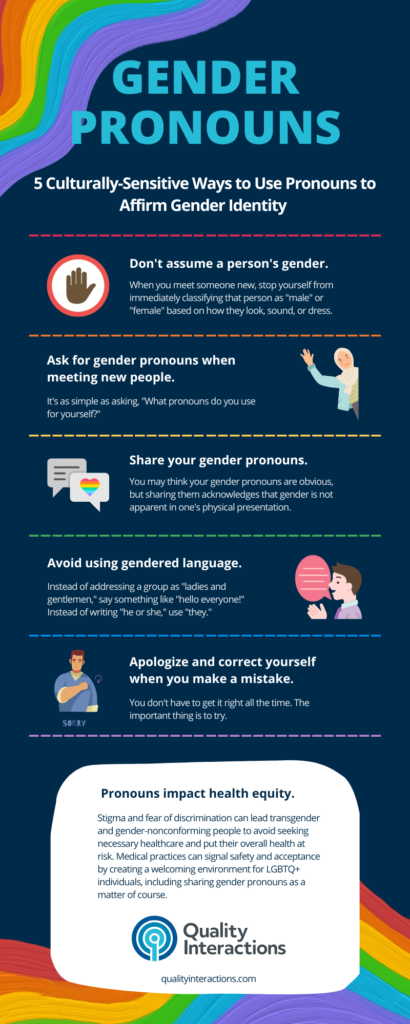International Pronouns Day (October 18, 2023)
Posted October 17, 2023 International Pronouns Day seeks to make respecting, sharing, and educating about personal pronouns commonplace. Referring to people by the pronouns they determine for themselves is basic to human dignity. Being referred to by the wrong pronouns particularly affects transgender and gender nonconforming people. Together, we can transform society to celebrate people’s multiple, intersecting identities.
International Pronouns Day seeks to make respecting, sharing, and educating about personal pronouns commonplace. Referring to people by the pronouns they determine for themselves is basic to human dignity. Being referred to by the wrong pronouns particularly affects transgender and gender nonconforming people. Together, we can transform society to celebrate people’s multiple, intersecting identities.
Incorporating pronouns into your medical practice is one significant way to signal safety and acceptance for trans, non-binary, and gender non-conforming people. Remember to share your pronouns and ask for theirs. #PronounsDay
Check out this archived webinar from Pacific AETC to learn more about how healthcare providers can make their practices more welcoming by using pronouns
Sexual History Taking and Sex Positivity (Click here to register)
This training is a pre-recorded webinar covering sexual history taking and sex positivity. Taking a thorough sexual history through a sex positivity framework allows the healthcare team to provide high-quality patient care by assessing and screening individuals for a broad range of sexual health concerns, including HIV and STI prevention, treatment, and care. This training will provide strategies for conducting complete sexual histories with a variety of patients and will discuss barriers that may hinder the process. Case discussions will be used to highlight examples. Registration is FREE! CME, Nursing CE, and Pharmacy CE will be available for participants.
Resources
From Quality Interactions:
Pronouns.org provides great resources and information on why pronouns matter, and how to encorporate the use of peoples pronouns into your daily practice. By visiting their website, you can lear more about
- WHAT ARE PERSONAL PRONOUNS AND WHY DO THEY MATTER?
- HOW DO I USE PERSONAL PRONOUNS?
- WHAT IF SOMEONE MAKES A MISTAKE AND MISPRONOUNS SOMEONE ELSE?
- HOW DO I SHARE MY PERSONAL PRONOUNS?
- HOW DO I ASK SOMEONE THEIR PERSONAL PRONOUNS?
- HOW DO I USE GENDER INCLUSIVE LANGUAGE?
- WHAT ADDITIONAL RESOURCES AND LINKS CAN HELP ME?

